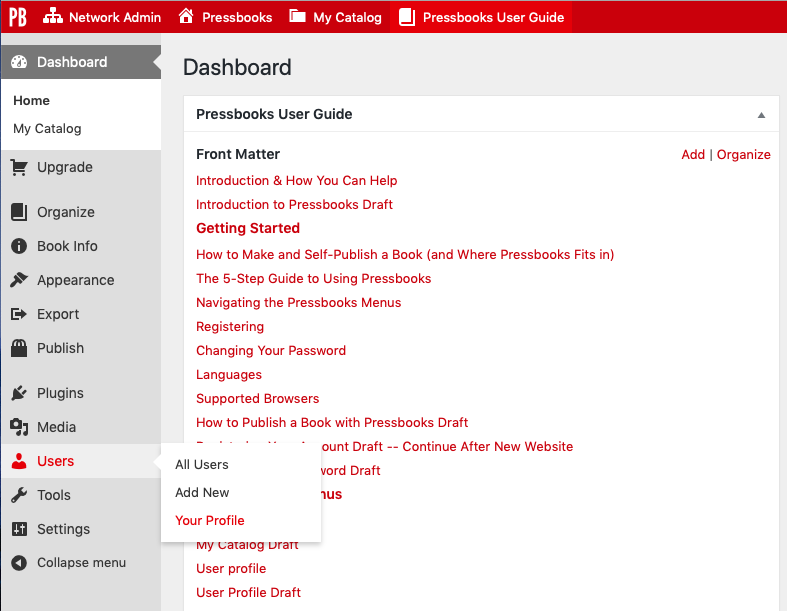2 User Profile
You can control settings for your account from your User Profile. In this chapter we’ll cover the following:
Accessing Your User Profile
You can access your User Profile settings in two ways: from the top menu, and from the sidebar menu.
From the Top Menu
Hover over your name in the top menu of Pressbooks. In the menu that appears, you can either click your name or “Edit My Profile” to be brought to the User Profile settings page.
From the Sidebar Menu
Hover over Users on the left sidebar menu and select Your Profile to be brought to your User Profile settings.
User Profile Settings
You can edit your User Profile to change account information, enable accessibility features, establish your user interface language, and more.
Personal Options
Personal Options in Pressbooks include the following features:
Visual Editor: Choose to enable or disable the visual editor while writing. When the visual editor is disabled, all content editors display only the text editor view, which allows users to edit the chapter in HTML format.
Syntax Highlighting: Choose to enable or disable syntax highlighting when editing code.
Admin Color Scheme: Choose between the default Pressbooks color scheme and the Pressbooks a11y color scheme. The a11y color scheme is an enhanced accessibility feature for users who wish to have stronger color contrasts between elements and all links in the admin menu set apart from surrounding text with a property other than color (they’re underlined). 
Keyboard Shortcuts: Choose to enable keyboard shortcuts to assist in comment moderation on webbooks. Comments can be enabled by a book administrator for any webbook. To read more about keyboard shortcuts for comment moderation, see the WordPress Codex.
Toolbar: Choose whether to view the Toolbar by default when using Pressbooks.
Language: Choose what language to use Pressbooks in. By default, your profile will be set to “Site Default.” When “Site Default” is selected, your user interface will always be in the language assigned in the book metadata for the specific book you’re editing. You can choose to override this by selecting a specific interface language.
Read more about language settings in user guide chapter Languages.
Name
Username: Your username is the only piece of account information that you cannot change.
First Name and Last Name: Insert your first and last name if you would like your name to display in the interface instead of your username.
Nickname: Your nickname defaults to your username. This can be changed if you’d like your username to display as something different.
Display name publicly as: Choose whether the name that displays in the Pressbooks interface is your full name, your first name, your last name, your username, or your nickname.
Contact Info
Email: Change what email account is associated with your Pressbooks account. By default, this field will be filled with the email address you used to register for Pressbooks. You can enter a new email address here to change it. You’ll receive an email to confirm the change; the new email address will not be connected to your account until you’ve confirmed the change.
Website, AIM, Yahoo IM, Jabber / Google Talk: Insert your contact information for various services that you would like associated with your Pressbooks account. We do not require or display this information in our interface.
About Yourself
Biographical Info: Insert a description about yourself. This info is visible to network administrators.
Profile Picture: Add a profile picture to Pressbooks by associated your account with Gravatar.
Account Management
New Password: Change your password while logged into Pressbooks. Click “Generate Password” to generate a random password for your account. If you don’t want a random password, erase the random generate characters and insert a password of your own. For more information, see Changing Your Password.
Sessions: Log out of your account from multiple devices or browsers at once by clicking “Log Out Everywhere Else.”


